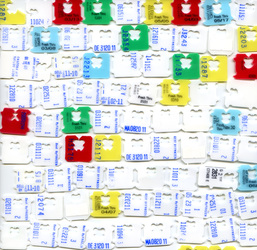Politics
A Dictionary of Errors
. . . there, there) to express that something has broken or burst. One day “Me and my friends” may replace “My friends and I” (maybe we’re really there, damn the grammar books). After all, ain’t “me” more important than me friends? One day “If I were
. . .”—normally used to express a hypothetical situation (the subjunctive voice)—will become “If I was.” Why? B/c (texting for “because”) it’s simply easier to remember. Why must we have all these rules we have to remember for the rest of our lives? Isn’t the important thing to communicate and get our ideas across in the simplest form possible? Mayhaps.
Items That Won’t Recycle

Current Reading
One Saturday I watched Michael Moore the filmmaker speak for three hours on C-SPAN’s Book-TV (I recorded it). A People’s History of the United States by Howard Zinn was a book he mentioned as having had great influence over his thinking. I’m about half-way through The People’s History, and I’ve learned a lot, too. One, Christopher Columbus was a murderer, who, along with other Spaniards, over a period of several years, wiped out an entire tribe on the island of Hispaniola. Hard to believe?
What about this? “Through all that growth, the upper class was getting most of the benefits and monopolized political power. A historian who studied Boston tax lists in 1687 and 1771 found that in 1687 there were, out of a population of six thousand, about one thousand property owners, and that the top 5 percent—1 percent of the population—consisted of fifty rich individuals who had 25 percent of the wealth. By 1770, the top 1 percent of property owners owned 44 percent of the wealth” (49).
Or this? At the beginning of the 20th century, writer Charles Beard noted that four groups “were not represented in the Constitutional Convention: slaves, indentured servants, women, and men without property” (91). Beard concluded: “The Constitution, then, illustrates the complexity of the American system: that it serves the interests of a wealthy elite, but also does enough for small property owners, for middle–income mechanics and farmers, to build a broad base of support. The slightly prosperous people who make up this base of support are buffers against the blacks, the Indians, the very poor whites. They enable the elite to keep control with a minimum of coercion, a maximum of law—all made palatable by the fanfare of patriotism and unity” (99).
Today’s “buffers”—the unemployed middle-class, unemployed students, unemployed graduates, underemployed union members, the disenfranchised elderly, all ethnic groups—have taken to Wall Street to march against this very same greed that has haunted our country since its inception. Let’s give them a few bucks a month to help out.



 RSS Feed
RSS Feed